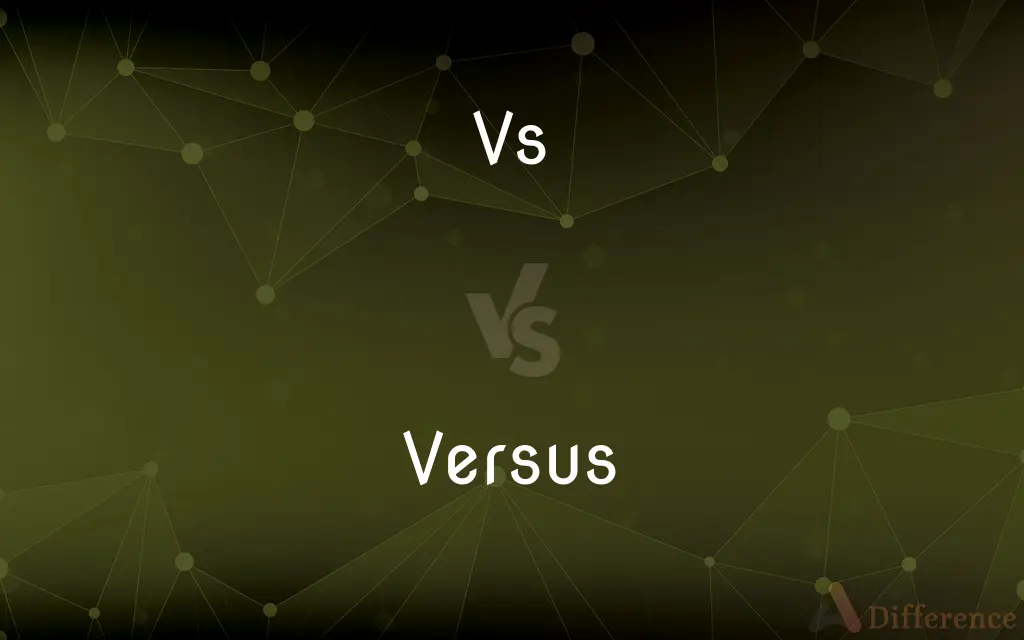Vs vs. Versus — What's the Difference?
Edited by Tayyaba Rehman — By Fiza Rafique — Updated on September 28, 2023
"Vs" is an abbreviation of the word "Versus", both indicating opposition or comparison between two entities.

Difference Between Vs and Versus
Table of Contents
ADVERTISEMENT
Key Differences
"Vs" and "Versus" are terms commonly used in English language contexts to denote a comparison or a conflict between two parties or subjects. The term "Vs" is essentially an abbreviated form of "Versus". Both words, in essence, share the same meaning but differ in their usage and formality.
In written content, especially in more formal documents or publications, it is preferable to use "Versus" as it maintains the formal tone of the writing. "Vs", on the other hand, is more colloquial and is often used in informal contexts such as sports games, debates, or everyday conversation.
Additionally, in legal contexts, "Versus" is frequently used, especially in case titles. For example, in the landmark case "Brown Versus Board of Education", the full word is employed. Conversely, "Vs" is often reserved for less formal mentions, such as a game lineup or a casual discussion comparing two options.
To sum it up, while "Vs" and "Versus" essentially denote the same concept, they differ in their level of formality and specific contexts of usage. "Versus" is more formal and comprehensive, whereas "Vs" is its shorter, informal counterpart.
Comparison Chart
Form
Abbreviation
Full word
ADVERTISEMENT
Formality
Informal
Formal
Common Usage
Sports, casual comparisons
Legal contexts, formal writing
Characters
2
6
Origin
Derived from "Versus"
Latin term meaning "against"
Compare with Definitions
Vs
Abbreviated form of "Versus".
Lions Vs Tigers: Which is stronger?
Versus
Used in legal contexts for cases.
The trial was People Versus Davis.
Vs
Indicates a comparison or contest.
Team A Vs Team B tonight!
Versus
A term denoting an against or as compared to relationship.
It's the old Versus the new in today's match.
Vs
Used to denote opposition.
Paper Vs Digital: The ongoing debate.
Versus
A word indicating opposition or comparison.
The case was Johnson Versus Smith.
Vs
Represents a challenge or matchup.
Player X Vs Player Y in the finals.
Versus
Signifying a choice or contrast between two options.
It's a battle of skill Versus luck.
Vs
Signifies a choice between two entities.
Coffee Vs Tea: What's your pick?
Versus
Represents a conflict or contention.
The debate is nature Versus nurture.
Vs
Alternative form of vs.
Versus
Against (especially in sporting and legal use)
England versus Australia
Vs
Obsolete typography of us
Versus
Abbr. v. or vs. In conflict or competition with; against
The plaintiff versus the defendant.
Michigan versus Ohio State.
Vs
Plural of v
Versus
As the alternative to or in contrast with
"freedom of information versus invasion of privacy" (Ian Hamilton).
Versus
Against; in opposition to.
It is the Packers versus the Steelers in the Super Bowl.
Versus
Compared with, as opposed to.
Versus
(legal) Bringing a legal action against, as used in the title of a court case in which the first party indicates the plaintiff (or appellant or the like), and the second indicates the defendant (or respondent or the like).
Brown v. Board of Education of Topeka, Kans.
Versus
Against; as, John Doe versus Richard Roe; - chiefly used in legal language, and abbreviated to v. or vs.
Common Curiosities
Is it incorrect to write "vs" in lowercase?
No, but "Vs" with a capital "V" is more common in American English.
What does Vs stand for?
"Vs" stands for "Versus".
Is there a difference in meaning between Vs and Versus?
No, both indicate opposition or comparison, but they differ in formality and usage.
Why is Versus derived from Latin?
Latin has influenced legal and formal English terms, and "Versus" means "against" in Latin.
Does Versus always denote conflict?
No, it can denote comparison, choice, or juxtaposition, not necessarily conflict.
Can I use Vs in formal writing?
While not wrong, it's preferable to use "Versus" in formal writing for clarity.
Why is Versus used in legal contexts?
"Versus" is traditional and formal, making it suitable for legal documents and case titles.
Can Versus be abbreviated in any other way?
"Vs" is the most common abbreviation, but "v." can also be used, especially in legal contexts.
Are there specific contexts where Vs is more appropriate than Versus?
"Vs" is more suited for informal contexts like sports matches or casual conversations.
Can I use Versus in everyday speech?
Yes, but "Vs" is more commonly heard in casual speech.
How do I pronounce "Vs"?
It's pronounced like "Versus".
Share Your Discovery

Previous Comparison
Netflix vs. Hotstar
Next Comparison
Captain vs. CoxswainAuthor Spotlight
Written by
Fiza RafiqueFiza Rafique is a skilled content writer at AskDifference.com, where she meticulously refines and enhances written pieces. Drawing from her vast editorial expertise, Fiza ensures clarity, accuracy, and precision in every article. Passionate about language, she continually seeks to elevate the quality of content for readers worldwide.
Edited by
Tayyaba RehmanTayyaba Rehman is a distinguished writer, currently serving as a primary contributor to askdifference.com. As a researcher in semantics and etymology, Tayyaba's passion for the complexity of languages and their distinctions has found a perfect home on the platform. Tayyaba delves into the intricacies of language, distinguishing between commonly confused words and phrases, thereby providing clarity for readers worldwide.














































